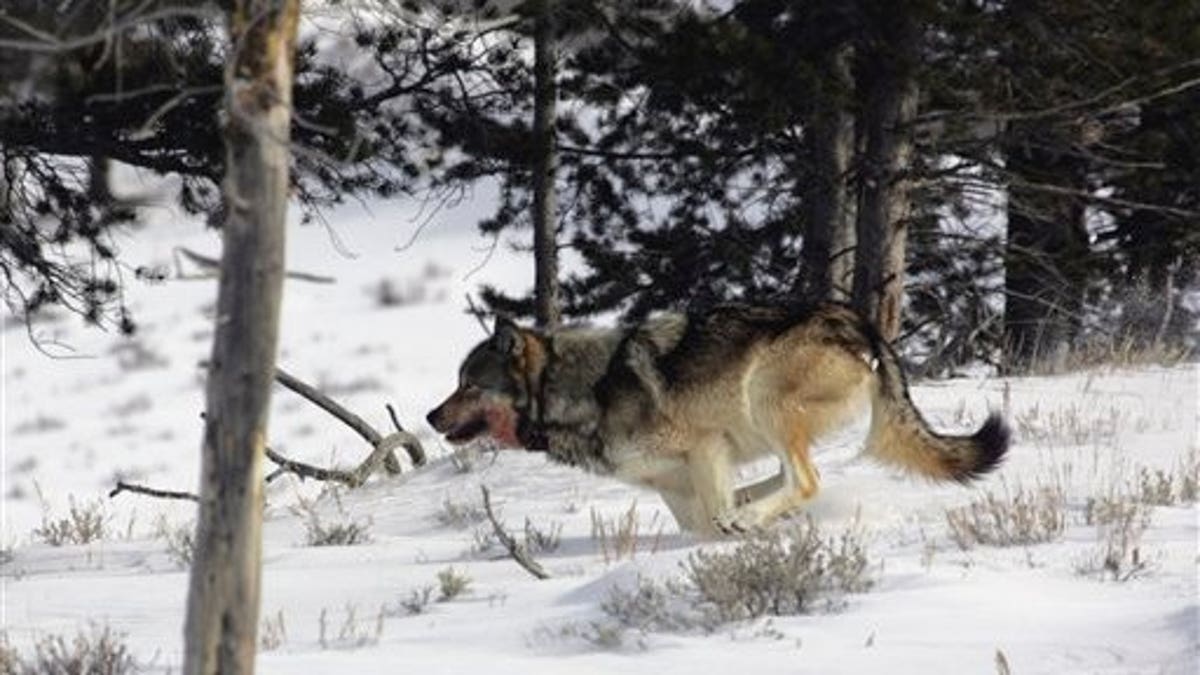
February 16: A gray wolf is seen on the run near Blacktail Pond in Yellowstone National Park in Park County, Wyo. Tens of thousands of gray wolves would be returned to the woods of New England, the mountains of California, the wide open Great Plains and the desert West under a scientific petition filed with the federal government Tuesday, July 20, 2010. (AP)
HELENA, Mont. – Wildlife advocates say a ruling to restore Endangered Species Act protections for gray wolves throughout the Northern Rocky Mountains buys time to create a better plan than the one the judge rejected, one that ensures their numbers don't dwindle again.
Meanwhile, state wildlife officials in Montana and Idaho were reviewing Thursday's ruling that blocked them from carrying out their wolf management plans and their preparations for wolf hunts this fall. State officials said they were considering their options, including an appeal.
U.S. District Judge Donald Molloy's ruling knocked down a U.S. Fish and Wildlife decision last year that kept federal protections in place in Wyoming, where state law is considered hostile to the animals' survival, but turned over to Montana and Idaho wolf management responsibilities within their borders.
Molloy said in his ruling that the entire Northern Rocky Mountain wolf population either must be listed as an endangered species or removed from the list, but the protections for the same population can't be different for each state.
Separating the protections may solve a tricky political issue, but it does not comply with the Endangered Species Act, Molloy ruled.
Gray wolves were listed as endangered in 1974, but following a reintroduction program in the mid-1990s, there are now more than 1,700 in the Northern Rockies, which includes all of Idaho, Montana and Wyoming, along with portions of Washington, Oregon and Utah.
Matt Skoglund of the National Resources Defense Council, one of the plaintiffs in the case, said a true recovery number would be at least 2,000 wolves in the region.
"We're real close to recovery. We've got 1,700 wolves in the Rockies. But we're not there," Skoglund said. "We want to see a plan in place that ensures genetic connectivity among the subpopulations and ultimately guarantees a sustainable wolf population."
State wildlife officials in Montana and Idaho say they are capable of managing the wolves within their borders, and that the population has rebounded to the point where there are now too many of the animals. The increase in the wolf population has brought livestock losses for ranchers and competition for hunters for big game, such as elk.
Carolyn Sime, wolf program coordinator for Montana Fish, Wildlife and Parks, said Montana has done everything it's been asked to do in developing its state management program but now will have to apply federal law and regulations once more.
Both states' management plans include wolf hunts that now must be scrapped. Montana wildlife regulators just last month set the wolf-hunt quota this year at 186 with the aim of reducing the state's wolf population for the first time since they were reintroduced.
"That's clearly a management tool that we want to have in the toolbox. We think it's legitimate and appropriate," Sime said.
At the end of 2009, there were at least 843 wolves in Idaho, 524 in Montana and 320 in Wyoming, with more in parts of Oregon and Washington state.
Defenders of Wildlife, the Greater Yellowstone Coalition, the NRDC and other wildlife advocates sued the federal government after the Fish and Wildlife Service decision in April 2009. They argued that the government's decision would have set a precedent allowing the government to arbitrarily choose which animals should be protected and where.
"The troubling consequences for the Endangered Species Act have been averted and the wolf hunts are blocked," Doug Honnold, an attorney for EarthJustice representing the plaintiffs, said Thursday
Idaho's congressional delegation released a statement that said Molloy's ruling ignored the exploding population of wolves and that the state can manage wolves in a sustainable and responsible way.
"We look for a more reasonable decision from a higher court," the statement from Sens. Mike Crapo and Jim Risch and Reps. Mike Simpson and Walt Minnick said.
Molloy's ruling could affect a lawsuit in which Wyoming charges the Fish and Wildlife Service had no reason to refuse to turn over management of gray wolves to Wyoming as it did to the other states. The case is before U.S. District Judge Alan B. Johnson of Cheyenne.
"If the rule is vacated, there's a question that Judge Johnson has to consider of whether or not there is something for him to decide," said Bruce Salzburg, Wyoming attorney general.









































